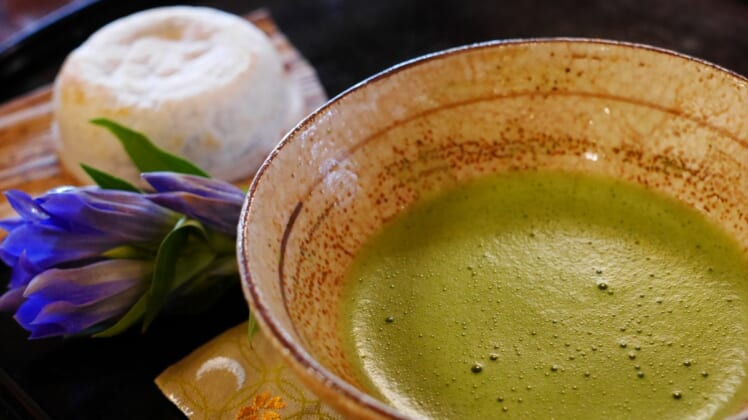
Recently, a reader asked a question about matcha powder. They want to know what it is and why people are drinking it instead of coffee in the morning. Is it really that good for you?
There are many answers to these questions, but to start off, here is some information about matcha powder:
What is matcha?
Matcha is a powdered version of green tea. In order for you to make it into a powder, you have to pick, dry, and grind special green tea leaves. Then, the powder can be added to beverages like lattes or just hot water.
Even more specifically, the green tea leaves used to make matcha powder are called matcha leaves. They tend to come from Japan and grow in the shade, which gives the leaves and the powder a unique green color.
Matcha tea is more potent than regular green tea. This is because only some of the nutrients from green tea bags steep into a cup of hot water. On the other hand, with matcha powder, you drink the actual tea leaves, and therefore, ingest more nutrients.
Additionally, matcha is only made up of tea leaves, so it is sugar-free, gluten-free, and vegan.
What are the benefits of matcha powder?
There are 6 main reasons why it can help your health. Matcha powder is . . .
1. Nutrient-rich
Matcha powder is full of nutrients, antioxidants, fiber, and chlorophyll. For example, it has vitamin C, vitamin A, potassium, and more. Drinking one cup of matcha gives you the same amount of antioxidants that drinking 10 cups of green tea does. Therefore, it is a healthy dietary addition that can help you get these important antioxidants.
2. Caffeinated
Matcha powder is listed to have anywhere from 35-70mg of caffeine. On the lower end, this is a small amount similar to a caffeinated soda. On the higher end, this caffeine content is not too far behind an average cup of coffee, which has about 95-200mg of caffeine. Matcha can be a good alternative to coffee for people looking to cut back on caffeine. It also has more nutrients and benefits than coffee does.
3. Mood enhancing
This idea is actually backed up by science because matcha contains L-theanine, which is an amino acid that relaxes the mind. This in addition to the caffeine content is known to wake people up as well as relax them, making it a mood enhancing product.
4. Tasty
Matcha tastes like green tea, but it is a lot stronger in flavor. This actually makes it taste better to people who really enjoy the flavor. It is slightly bitter and plant-like, but it also has a slight sweetness. This makes it easy to add to foods and drinks, especially because the flavor becomes milder as it is added to other ingredients.
5. Cancer-fighting
Some sources claim that matcha powder has antioxidants that prevent and fight cancer. For example, Time.com states that matcha contains catechin called EGCG (epigallocatechin gallate), which is suspected to lower cancer risk. However, this is only based on evaluations of green tea users and their health outcomes. It is not backed by actual studies about matcha’s effect on the body as relating specifically to cancer.
6. Detoxing
This feature is also based on the reasoning behind matcha’s cancer-fighting quality. Matcha is said to help detox the body with its special antioxidants. This is because the product balance your body’s pH and as a result, can even help you lose weight.
How do people use it?
People are using it as a substitute for coffee and tea in the morning. Tons of coffee shops like Starbucks have matcha-based lattes and tea drinks.
However, there are even more adventurous users out there. For example, matcha powder is showing up in cocktails. A lot of popular restaurants in New York City, for example, have matcha cocktails on their menu. People who believe in its powers are willing to add it to practically everything, even when they are looking for a fun night out.
Matcha ice cream is also a huge food trend at the moment. First avocado ice cream appears on the shelves, and now another green product, matcha powder, is making its way into ice cream. Matcha ice cream is a popular dessert in restaurants, especially for Japanese cuisine, but there are also tons of recipe ideas online.
Lastly, people are using matcha powder in practically any kind of recipe they can. For example, matcha yogurt bars, matcha crepes, and matcha rice are all creations people came up with to incorporate the tea into their daily lives.
To sum up, matcha powder definitely has a lot of science backing up its health benefits like extra nutrients and antioxidants. Whether it will be the next great weight loss product or the cure to cancer is yet to be determined, though.
